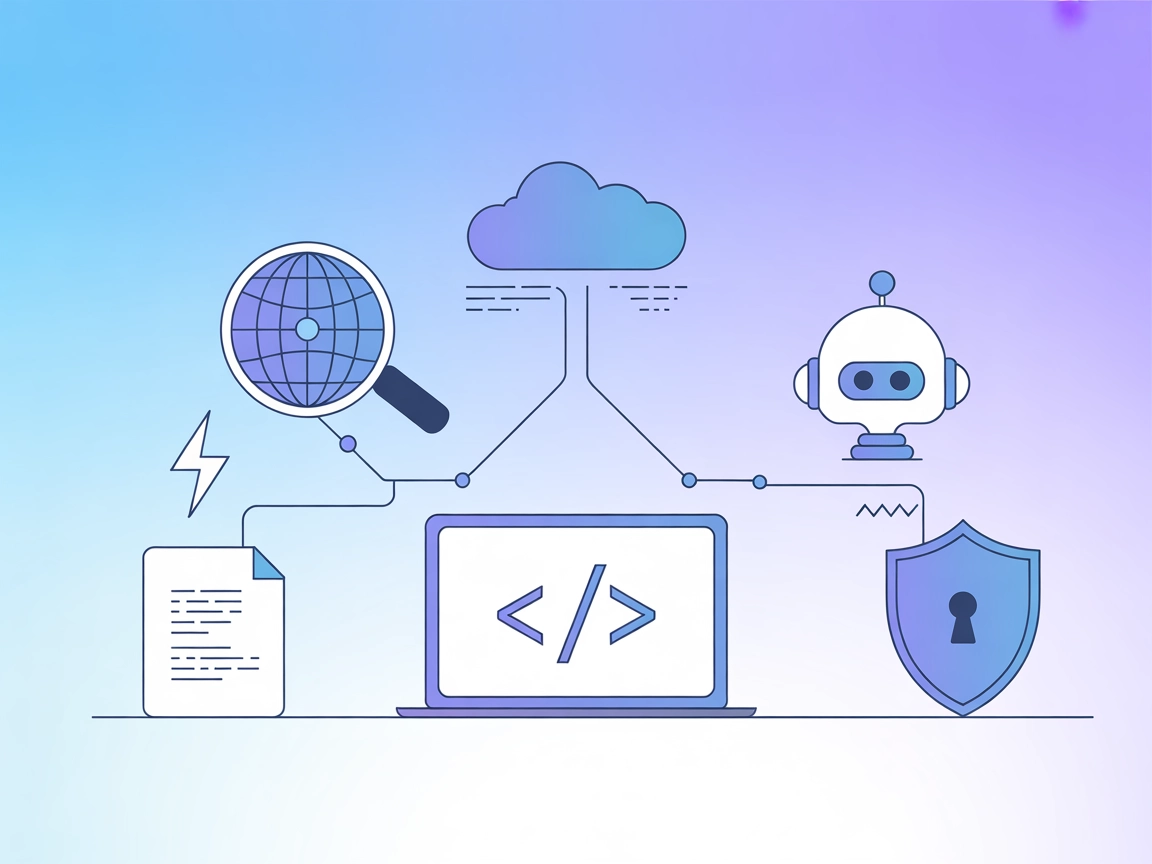
Model Context Protocol (MCP) Server
The Model Context Protocol (MCP) Server bridges AI assistants with external data sources, APIs, and services, enabling streamlined integration of complex workfl...

Connect AI agents to your 1Panel environment for automated system management, secure workflows, and real-time operations with FlowHunt’s 1Panel MCP Server integration.
FlowHunt provides an additional security layer between your internal systems and AI tools, giving you granular control over which tools are accessible from your MCP servers. MCP servers hosted in our infrastructure can be seamlessly integrated with FlowHunt's chatbot as well as popular AI platforms like ChatGPT, Claude, and various AI editors.
The 1Panel MCP Server is an implementation of the Model Context Protocol (MCP) server designed specifically for integration with 1Panel
. It serves as a bridge connecting AI assistants with the 1Panel platform, enabling enhanced development workflows by allowing AI agents to interact programmatically with 1Panel’s APIs and data sources. By deploying this server, developers can use AI-powered tools to automate and streamline common administrative and operational tasks within their 1Panel environments, such as querying system status, managing files, or executing control commands. The server supports multiple transport methods (stdio and sse), offering flexibility for integration in various environments, and can be securely configured with API tokens and host addresses.
No prompt templates are mentioned in the available documentation or code.
No explicit MCP resources are described in the available documentation or code.
No specific tools are listed or described in the available documentation or code (e.g., server.py does not exist in this Go-based project).
Ensure you have the 1Panel MCP Server binary or Docker image.
Obtain your 1Panel access token and host URL.
Edit the Windsurf configuration file.
Add the following JSON snippet under mcpServers:
{
"mcpServers": {
"mcp-1panel": {
"command": "mcp-1panel",
"env": {
"PANEL_ACCESS_TOKEN": "<your 1Panel access token>",
"PANEL_HOST": "such as http://localhost:8080"
}
}
}
}
Save and restart Windsurf, then verify the server connection.
{
"mcpServers": {
"mcp-1panel": {
"command": "docker",
"args": [
"run",
"-i",
"--rm",
"-e",
"PANEL_HOST",
"-e",
"PANEL_ACCESS_TOKEN",
"1panel/1panel-mcp-server"
],
"env": {
"PANEL_HOST": "such as http://localhost:8080",
"PANEL_ACCESS_TOKEN": "<your 1Panel access token>"
}
}
}
}
mcpServers.Ensure 1Panel MCP Server is installed.
Get your access token and host URL.
Edit the Cursor configuration file.
Add:
{
"mcpServers": {
"mcp-1panel": {
"command": "mcp-1panel",
"env": {
"PANEL_ACCESS_TOKEN": "<your 1Panel access token>",
"PANEL_HOST": "such as http://localhost:8080"
}
}
}
}
Save changes and restart Cursor.
If using SSE mode, start the server with:
mcp-1panel -host http://localhost:8080 -token <your 1Panel access token> -transport sse -addr http://localhost:8000
Add to mcpServers:
{
"mcpServers": {
"mcp-1panel": {
"url": "http://localhost:8000/sse"
}
}
}
Store API keys and sensitive info in environment variables. Example configuration:
{
"mcpServers": {
"mcp-1panel": {
"command": "mcp-1panel",
"env": {
"PANEL_ACCESS_TOKEN": "${PANEL_ACCESS_TOKEN}",
"PANEL_HOST": "${PANEL_HOST}"
}
}
}
}
Replace ${PANEL_ACCESS_TOKEN} and ${PANEL_HOST} with your environment variable names.
Using MCP in FlowHunt
To integrate MCP servers into your FlowHunt workflow, start by adding the MCP component to your flow and connecting it to your AI agent:

Click on the MCP component to open the configuration panel. In the system MCP configuration section, insert your MCP server details using this JSON format:
{
"MCP-name": {
"transport": "streamable_http",
"url": "https://yourmcpserver.example/pathtothemcp/url"
}
}
Once configured, the AI agent is now able to use this MCP as a tool with access to all its functions and capabilities. Remember to change “MCP-name” to “mcp-1panel” and replace the URL with your own MCP server URL.
| Section | Availability | Details/Notes |
|---|---|---|
| Overview | ✅ | |
| List of Prompts | ⛔ | No prompt templates provided |
| List of Resources | ⛔ | No explicit resources listed |
| List of Tools | ⛔ | No tools listed in code or docs |
| Securing API Keys | ✅ | Environment variable approach described |
| Sampling Support (less important in evaluation) | ⛔ | Not mentioned |
The 1Panel MCP Server offers clear installation and integration instructions and is actively maintained with a good number of stars and forks. However, the lack of detailed tool, prompt, and resource descriptions in the documentation limits its out-of-the-box usability for complex AI workflows. Based on the above, we rate this MCP implementation a 5/10 for completeness and developer friendliness.
| Has a LICENSE | ✅ (GPL-3.0) |
|---|---|
| Has at least one tool | ⛔ |
| Number of Forks | 17 |
| Number of Stars | 127 |
The 1Panel MCP Server connects AI agents to the 1Panel server management platform, enabling automation, system status queries, and secure server operations through standardized AI interfaces.
You can automate tasks such as service restarts, user management, system status checks, and other administrative operations using AI-driven scripts and workflows.
Store sensitive information like API tokens and host URLs in environment variables, and reference them in your MCP server configuration to avoid exposing credentials.
Yes, it supports SSE (Server-Sent Events) for live, streaming interactions, allowing real-time monitoring and prompt responses between AI agents and 1Panel.
The 1Panel MCP Server offers clear installation and integration steps, but currently lacks detailed tool and prompt documentation, making it best suited for developers familiar with 1Panel and custom AI workflows.
Empower your server management with AI-driven automation and secure integrations using the 1Panel MCP Server in FlowHunt.

The Model Context Protocol (MCP) Server bridges AI assistants with external data sources, APIs, and services, enabling streamlined integration of complex workfl...

The Search1API MCP Server integrates real-time web search and crawling capabilities into AI agents via the powerful Search1API, enabling live information retrie...

The ScreenshotOne MCP Server bridges AI assistants with the ScreenshotOne API, enabling automated website screenshot capture for development, QA, reporting, and...
Cookie Consent
We use cookies to enhance your browsing experience and analyze our traffic. See our privacy policy.